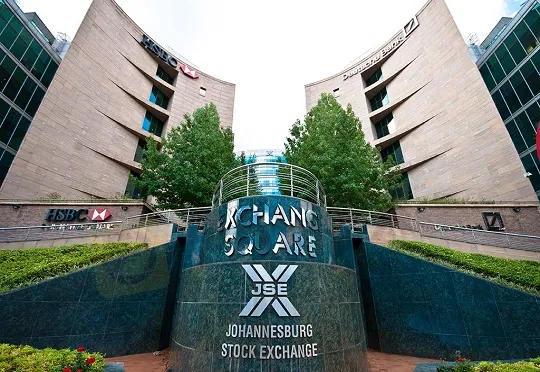简体中文
繁體中文
English
Pусский
日本語
ภาษาไทย
Tiếng Việt
Bahasa Indonesia
Español
हिन्दी
Filippiiniläinen
Français
Deutsch
Português
Türkçe
한국어
العربية
The Johannesburg Stock Exchange (JSE) Amends Debt Listing Requirements
Abstract:The Johannesburg Stock Exchange (JSE) has announced that it has changed its debt listing standards, resulting in the creation of a new Transition Segment and the enlargement of the current Sustainability Segment. The Financial Sector Conduct Authority (FSCA) has accepted these changes, which will take effect on April 11, 2022.
The Johannesburg Stock Exchange (JSE) has announced that it has changed its debt listing standards, resulting in the creation of a new Transition Segment and the enlargement of the current Sustainability Segment. The Financial Sector Conduct Authority (FSCA) has accepted these changes, which will take effect on April 11, 2022.

The Transition Segment will serve as a marketplace for Transition Debt Securities, allowing issuers to raise financing for the climate or transition-related purposes. Transition finance is expected to play a significant role in enabling a just transition and is especially important for a carbon-intensive economy like South Africa in helping us meet our national commitment to the Paris Agreement and the associated goal of being net-zero by 2050 as part of our nationally determined contributions (NDCs).
Sustainability Use of Proceeds Debt Securities or Sustainability-Linked Debt Securities will be used to fund the Transition Debt Securities. Sustainability-linked securities do not require a ring-fencing of proceeds, allowing the issuer to use the proceeds of a capital raise in whatever way it sees fit, as long as it satisfies the agreed-upon goals and targets connected to its sustainability objectives.
These securities are forward-looking and are also known as performance-linked securities. The issuer will be required to report on its performance against its goals on an annual basis, and the cost of capital will be tied to the achievement of these goals via a “step-up” or “step-down” aspect.
Sustainability Use of Proceeds Debt Securities, which require issuers to declare which sustainability assets they will invest the proceeds in, are now listed on the JSEs Sustainability Segment. The JSE enlarged the Green Bond Segment into a full-fledged Sustainability Segment in June 2020, allowing corporations to list social, green, and sustainability bonds on one platform for the first time, as well as allow investors to trade in these securities.
JSEs Sustainability Segment has raised its market capitalization to R21.421 billion since its expansion in 2020, and the introduction of Sustainability-Linked Debt Securities to the Segment will increase market capitalization even more.
Disclaimer:
The views in this article only represent the author's personal views, and do not constitute investment advice on this platform. This platform does not guarantee the accuracy, completeness and timeliness of the information in the article, and will not be liable for any loss caused by the use of or reliance on the information in the article.
Read more

5 Overlooked Details That Could Make or Break Your Trades
Trading requires more than just a solid strategy. Success often depends on paying attention to small details. These details may seem unimportant but can have a big impact. Many traders ignore them, only to realise their importance later.

Forex Trends: What the Chinese Zodiac Says About the Lunar New Year Market Movements
The Lunar New Year, a celebration rich with tradition, culture, and symbolism, marks the beginning of a new year in the Chinese calendar. Beyond the vibrant parades and festivities, the occasion holds significant meaning in various sectors, including the financial markets.

Can You Really Trust Offshore Brokers?
Offshore brokers have become a popular choice for traders around the world. They often promise low fees, high leverage, and access to global markets. Many traders see these benefits and decide to open accounts. But the big question remains: Can offshore brokers be trusted?

Italy’s CONSOB Orders Blockage of Five Unauthorized Investment Websites
Italy’s Companies and Exchange Commission (CONSOB) has issued a fresh round of orders to block access to five unauthorized financial service websites operating without proper licenses.
WikiFX Broker
Latest News
NBI Busts Crypto and Phishing Scam Operation in Parañaque City
Doo Prime Officially Launches Trading for OFFICIAL TRUMP (TRUMP/UST)
Acuity Trading Integrates Its Cutting-Edge Tools with cTrader to Revolutionize Trading Experiences
Phemex Hacked: $37 Million Loss Raises Crypto Security Concerns
Khazanah Nasional Bets on Developed Markets Amid Global Shifts
Trump Urges OPEC to Lower Oil Prices
British Museum hit by alleged IT attack by ex-worker
Japan May Face Significant Interest Rate Hikes
Philippines Launches 10-Year & 25-Year USD Global Bonds
Binance Kicks Off 'It's Still Early for Crypto' Campaign
Currency Calculator






